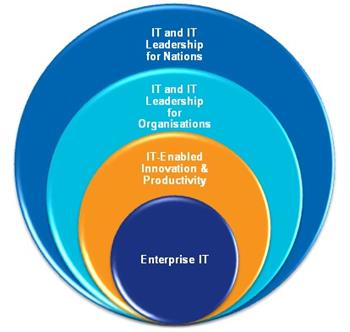Emerging opportunities from the industry see ISS growing its education, consulting and research activities to meet new demands. ISS will continue to innovate, invest in talent and applied research to stay industry-relevant.

Lim Swee Cheang, Director & CEO of ISS, weighs in on the opportunities arising from global technology transition and the strategy ISS is taking to reposition itself for growth and capability development.
Q: How is ISS meeting the challenges presented in emerging infocomm opportunities?
ISS has been around since 1981. Over the years, we have led the infocomm industry in many best practices, aligned our mission with the national manpower capability development agenda, and catered to the industry’s needs. We will continue in those directions.
ISS is one of the first institutions to implement a performance-based system. We have practised meritocracy from the start and always encouraged our teaching staff to be inquisitive. To do that, we created an environment where people are allowed to fail to learn, and not failed to learn.
To stay relevant in our curriculum, I require the teaching staff to design courses in consultation with the industry and customers. It has become a standard practice for ISS to solicit feedback at the end of each course to assess its relevance, quality and usefulness. Courses are improved or redesigned through the feedback loop.
Besides training, our team provides consultation and conducts applied research on topical infocomm issues to maintain our thought leadership and stay informed of key issues in the industry. Our post-graduate programmes’ internship arrangement with partner organisations is another source of market intelligence that we regularly use.
We lead the industry in best practices, such as COBIT and Business Process Reengineering, and we are an advocate in the use of the agile methods in infocomm development and planning. The new perspectives and principles of the agile practices are commensurate with the rapid pace of technology development. It allows infocomm planners, managers and developers to constantly responding to change through collaboration with customers, relying on knitted interactions amongst team members, and continuously delivering working business solutions in the midst of shifting technology landscape and emerging opportunities.
As a training provider, we avoid duplicating what other industry players are already offering. Instead, we prefer collaboration and will often address gaps that are neglected by the industry. Over the years, the evolution of ISS is a testament to this strategic outlook where we move from process reengineering and integrated solutions to providing service innovation and IT leadership, which is where we are today. We want to partner with our customers to establish business strategies that can address the immediate challenges and capable of adapting to change.
Q: What do you think is the single greatest challenge ISS is facing today?
Talent. ISS is a unique organisation where our teaching staff members are required to fulfil a triple role in education, consulting and applied research. Even with our present strength of 48 teaching staff and 50-over adjuncts, we need more talents who can lead, guide and groom future generations of infocomm professionals, and provide advice and consultancy to the industry. One way is to tap into our alumni, which is a wide source of talent.
Q: Close to 90,000 members in your alumni have benefitted from various programmes provided by ISS. Can ISS maintain its lead?

I always see ISS as a small outfit with a big heart. We have a strong team in ISS, with six former CIOs on board and an average of 24 years of working experience for our teaching staff. Through our Capability Development Focus (see diagram on the left), we develop a series of coursework and programmes that benefit the infocomm industry and cater to the national infocomm agenda. This will continue to be our focus, which I believe is still relevant and will meet the stakeholders’ expectation while serving the interests of both the infocomm industry and ISS well.
Besides that, we work at creating new intellectual properties through the discovery of industry characteristics in our consultancy and applied research works. These findings are published and shared through case studies and conference papers, as well as used in the courseware development and teaching.
We have also embarked on senior executive programmes and update seminars on technology, innovation and management that establish ISS’ thought leadership in areas such as agile practices, e-Government leadership, social business, business analytics, service innovation, enterprise architecture, and many emerging technologies and practices. These events continue to be well attended by industry leaders and technology influencers.
Q: Today, with deep mobile penetration, leading to innovation like on-demand software, large database analytics and cloud computing. What are ISS’ priorities in education, consulting and research?
In the area of education, ISS will continue to invest in practice-based learning. We have found that learning and practicing skills and knowledge on the job is the most useful pedagogy approach for infocomm professionals. We will also be exploring the potential of online open courses to step up the infocomm competency of IT and business professionals.
In consulting, we will continue to collaborate with the government and local infocomm agencies like the Singapore Infocomm Development Authority (IDA), Workforce Development Agency (WDA) of Singapore, Singapore Computer Society (SCS), Information Technology Management Association (ITMA) and Singapore infocomm Technology Federation (SiTF) to address issues on the national agenda and support the growth and competitiveness of our infocomm industry.
As for applied research, the ISS team is developing new methodologies and practices that can co-create competitive advantages for organisations in new inter-disciplinary growth areas, such as service innovation, agile framework, mobile technology, cloud computing, and big data analytics.
Q: Innovation is a buzz word today. How can the IT industry be innovative?
Our IT industry is searching for original ideas to create new products and services that can disrupt existing business paradigms, create new business models, provide compelling users experience, and transform customer lifestyle.
While such ideas are not easy to come by, we have to create an interdisciplinary environment that will change the mindset of people and nurture infocomm professionals to collaborate closely with customers and technology partners leading towards such aspirations. In doing so, we will need new breed of leaders with innovative and collaborative mindset, comfortable in working in an interdisciplinary setting, be able to co-generate new ideas and co-develop innovative products to create sustainable competitive advantages for businesses.
For that to happen, we need infocomm professionals who are passionate in technology, have an in-depth understanding of core technologies as well as the nuances of market dynamics and business acumen. They will also need interpersonal skills, more hands-on exposure and keen interest in applied research to hone their application skills and knowledge.
Q: What is your outlook and plan for ISS in the near to mid-term?
In the near to mid-term, ISS will be focusing on several growth areas that include the ICT enablement of the service sector, capability development for SMEs and start-ups, social business development, enterprise innovation and business analytics.
We will continue to refresh our ever-green focus, such as project management, strategic IT management, software engineering, smart systems development, systems and business analysis to inject emerging technologies and new management principles to enable our students to drive significantly better productivity in their organisations.
We continue to get a lot of interest from foreign governments in our eGovernment Leadership programme. This will be another specific area of growth and collaboration for ISS.
This article is first published in NUS-ISS quarterly e-newsletter, Issue 4 (Oct-Dec 2013).